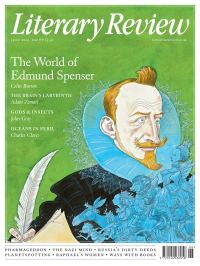Jonathan Keates
Wolfgang’s World
Mozart at the Gateway to His Fortune: Serving the Emperor, 1788–1791
By Christoph Wolff
W W Norton 244pp £18.99
Side by side with one another there now exist two radically different versions of Mozart’s life. The less obviously dramatic of the two tells the story of a jobbing composer amid the busy and highly competitive atmosphere of musical Vienna in the eighteenth century’s closing decades. He marries, fathers children, makes friends, gains useful contacts within his professional circle, and lives quite comfortably in a sequence of rented apartments across the city. While not wholly successful in securing the most desirable positions at court, he enjoys the favour of Emperor Joseph II and the Habsburg establishment. When Joseph dies and is succeeded by his brother, the less musically inclined Leopold, Grand Duke of Tuscany, it is Mozart who is summoned to provide the opera celebrating the new sovereign’s coronation in Prague. Supposedly Leopold’s cloth-eared empress describes La clemenza di Tito as ‘una porcheria tedesca’ – ‘German pigswill’ – but the composer has other things to worry about, in the shape of a first-night cast hopelessly unequal to his splendid score. A few months later he falls ill and dies, perhaps from kidney disease, its impact exacerbated by overwork and financial anxieties. As his sister, Nannerl, laconically observes, ‘He didn’t know how to handle the money.’
The other Mozart story is mostly made up of tarradiddles generated by that romantic cliché that requires great artists to lead miserable lives, undervalued or else utterly ignored by their contemporaries, largely, it seems, so that later generations may claim credit for identifying their genius. In Mozart’s case the most

Sign Up to our newsletter
Receive free articles, highlights from the archive, news, details of prizes, and much more.@Lit_Review
Follow Literary Review on Twitter
Twitter Feed
How to ruin a film - a short guide by @TWHodgkinson:
Thomas W Hodgkinson - There Was No Sorcerer
Thomas W Hodgkinson: There Was No Sorcerer - Box Office Poison: Hollywood’s Story in a Century of Flops by Tim Robey
literaryreview.co.uk
How to ruin a film - a short guide by @TWHodgkinson:
Thomas W Hodgkinson - There Was No Sorcerer
Thomas W Hodgkinson: There Was No Sorcerer - Box Office Poison: Hollywood’s Story in a Century of Flops by Tim Robey
literaryreview.co.uk
Give the gift that lasts all year with a subscription to Literary Review. Save up to 35% on the cover price when you visit us at https://literaryreview.co.uk/subscribe and enter the code 'XMAS24'